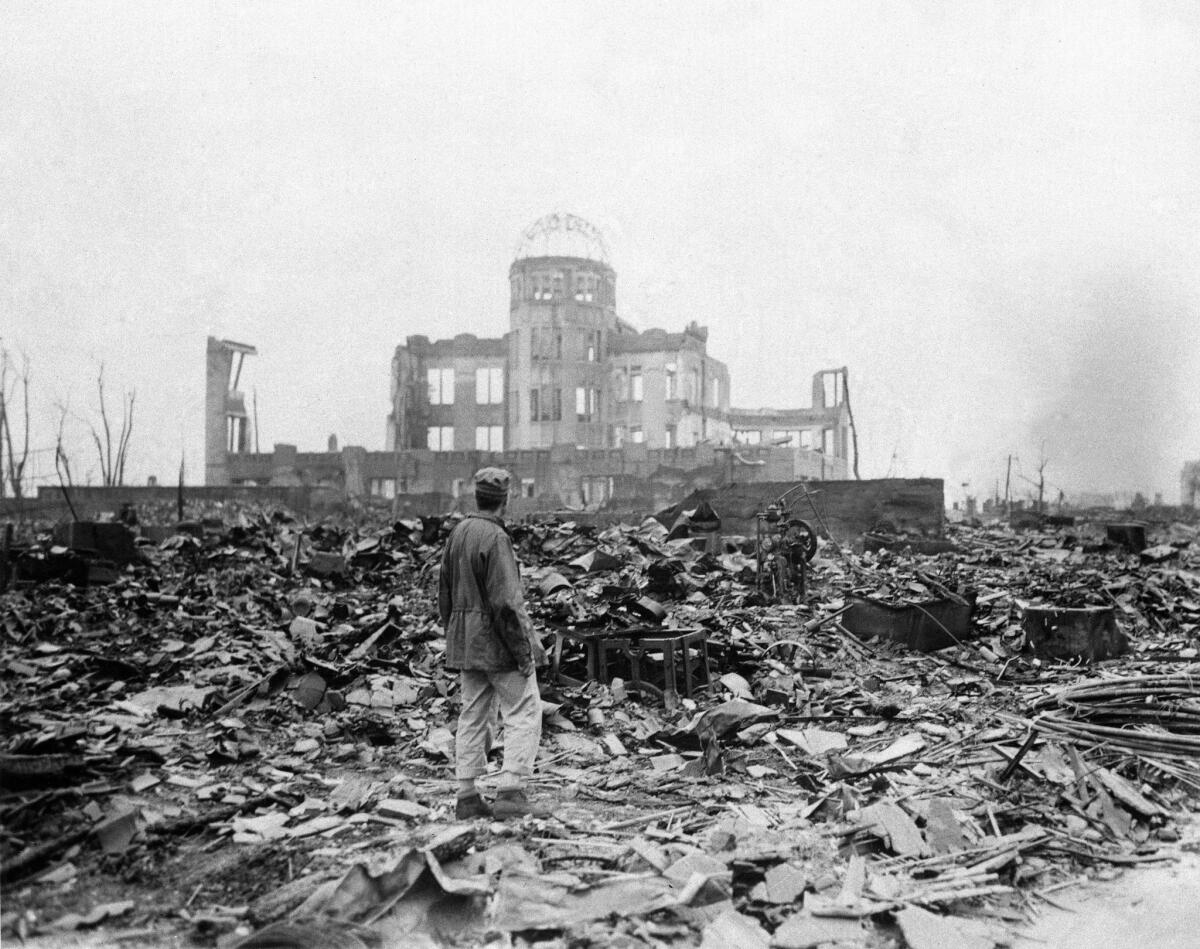Editorial: Obama’s visit to Hiroshima isn’t an apology. It’s a call to learn from the past

In this Sept. 8, 1945 file photo, an allied correspondent stands in the rubble in front of the shell of a building that once was a movie theater in Hiroshima, Japan, a month after the first atomic bomb ever used in warfare was dropped by the U.S.
- Share via
Seven decades ago, the United States dropped the first — and last — atom bombs ever used in war onto two Japanese cities, killing approximately 200,000 people, hastening the end of the Second World War and beginning a difficult and painful moral and historical debate that continues to this day. On Tuesday, President Obama waded in to that troubled discussion when he announced he would visit the first of those cities — Hiroshima — during a trip to Japan later this month. He would be the first sitting president to do so.
The hand-wringing began immediately. Surely the president’s trip will serve as an unwarranted apology for President Truman’s 1945 decision to bomb Hiroshima and Nagasaki, opponents insisted. Even if he doesn’t apologize explicitly, they worried, won’t his visit suggest contrition? American weakness? Lack of resolve?
This is silliness. The president is absolutely right to visit Hiroshima’s Peace Memorial Park, where aides say he will likely reaffirm America’s strong ties to Japan while reemphasizing his belief in nuclear nonproliferation. And while he will no doubt pay tribute — as he should — to the people, overwhelmingly civilians, who died in the bombings, that’s not the same as apologizing. It is an embrace of history, a recognition of the tragic cost of combat and of the horrors of atomic warfare. That seems entirely appropriate in 2016, when more than two dozen violent conflicts are underway around the globe.
The devastation wrought by Little Boy and Fat Man, the benign-sounding nicknames given to the bombs that were dropped on Hiroshima and Nagasaki, is almost unimaginable. Yet compared with today’s nuclear warheads, those two were insignificant. In 1961, the Soviet Union tested a hydrogen bomb in the Arctic with an explosive force of 50 megatons — more than 3,000 times the power of the bomb the U.S. dropped on Hiroshima only 16 years earlier. Such a weapon would kill millions. Currently, nine nations own more than 15,000 nuclear weapons, most of them far more powerful than the World War II bombs.
The overwhelming destructive force of nuclear weapons, and the fragility of peace, are what the president and the world should focus on, rather than wrangling over the symbolism of a visit to a memorial. Consider North Korea, Iran, India and Pakistan. Consider the the risk of “loose” Cold War-era warheads falling into the hands of terrorists. The nuclear threat remains real.
The debate may continue forever over whether the shortening of World War II justified the loss of so many civilian lives. Obama need not answer those questions. The president can instead send this unambiguous message: If the world is searching for peace, expanding its nuclear arsenal is the wrong way to get there. The past is not necessarily prologue. Unless, of course, we refuse to learn from it.
Follow the Opinion section on Twitter @latimesopinion and Facebook
A cure for the common opinion
Get thought-provoking perspectives with our weekly newsletter.
You may occasionally receive promotional content from the Los Angeles Times.






